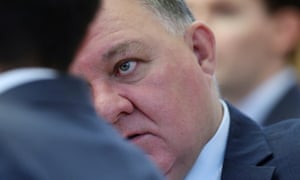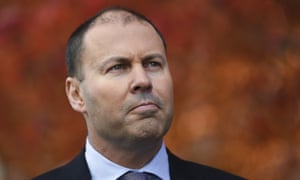Extract from The Guardian
Josh Frydenberg is besieged by unreconcilable demands – and it’s crunch time for his policy
Some political weeks careen – this past one being a case in point. By week’s end, all eyes were on One Nation. As blow-ups go, a live-action fracture playing out on evening subscription television was a solid A-plus for spectacle.
When it comes to Pauline Hanson, we’ve seen this trajectory before – a tearful but plucky leader of a self-styled righteous political insurgency let down by the blokes who are only in public life for the perks. So hard to get good help these days. Don’t cry for me, Argentina, I will survive. Moving stuff.
Of course this latest implosion is serious for One Nation and the Coalition. One Nation loses leverage in the Senate, and the government is again hostage to chaos from populist forces in the upper house. Poor old Mathias Cormann. What a time.
But frankly, the government would have been relieved over the past 48 hours to play second fiddle to a more epic foot-stamping, hair-tossing, door-slamming soap opera, after a week where it suffered its own bout of internal fracture and free-range chaos.
The week began promisingly when the government gained a Senate number, Steve Martin, in Tasmania, but then things got choppy. Barnaby Joyce was dispatched on medical leave after all hell broke loose when it was revealed he’d been paid $150,000 for a tell-all TV interview. Michaelia Cash was subpoenaed to give evidence in court, and Greg Hunt washed up on the front page of the tabloids after an expletive-ridden confrontational tirade against a local mayor. For the record, bad Greg was very sorry.
Spectacle also gave way to fractures. The government had to pull its own legislation imposing more regulation on the live sheep trade because it wasn’t sure it could keep its own numbers together, given several Liberals now favour a phase-out and ban, and Sussan Ley made it known to colleagues that she was of a mind to cross the floor.
Then there was energy, bubbling away in the background. We’ve been circling around the crux of this debate for months, and after a long period of suspended animation, we are now moving towards a crunch point.
Tony Abbott made two incursions this week, and his forays cross over. Abbott confronted the energy minister in the Coalition party room on Tuesday, making it clear he wanted the national energy guarantee to come back to the party room before Josh Frydenberg meets with state energy ministers in August.
Internal critics say Frydenberg does not currently have a settled mandate from colleagues to deal with the states. They say the party room has not yet agreed to an emissions reduction target for electricity of 26% on 2005 levels by 2030 – at least not one with a linear trajectory.
They want another discussion. Frydenberg doesn’t, given talk can only mean trouble. He insists he got the required sign-off last October, and will have another party room discussion on the enabling legislation for the policy after he’s reached a deal with the states.
The second Abbott fly-by concerned the future of his factional ally, the outspoken conservative MP Craig Kelly. Kelly and Abbott have led the internal pushback on climate and energy policy.

When it comes to Pauline Hanson, we’ve seen this trajectory before – a tearful but plucky leader of a self-styled righteous political insurgency let down by the blokes who are only in public life for the perks. So hard to get good help these days. Don’t cry for me, Argentina, I will survive. Moving stuff.
Of course this latest implosion is serious for One Nation and the Coalition. One Nation loses leverage in the Senate, and the government is again hostage to chaos from populist forces in the upper house. Poor old Mathias Cormann. What a time.
But frankly, the government would have been relieved over the past 48 hours to play second fiddle to a more epic foot-stamping, hair-tossing, door-slamming soap opera, after a week where it suffered its own bout of internal fracture and free-range chaos.
The week began promisingly when the government gained a Senate number, Steve Martin, in Tasmania, but then things got choppy. Barnaby Joyce was dispatched on medical leave after all hell broke loose when it was revealed he’d been paid $150,000 for a tell-all TV interview. Michaelia Cash was subpoenaed to give evidence in court, and Greg Hunt washed up on the front page of the tabloids after an expletive-ridden confrontational tirade against a local mayor. For the record, bad Greg was very sorry.
Spectacle also gave way to fractures. The government had to pull its own legislation imposing more regulation on the live sheep trade because it wasn’t sure it could keep its own numbers together, given several Liberals now favour a phase-out and ban, and Sussan Ley made it known to colleagues that she was of a mind to cross the floor.
Then there was energy, bubbling away in the background. We’ve been circling around the crux of this debate for months, and after a long period of suspended animation, we are now moving towards a crunch point.
Tony Abbott made two incursions this week, and his forays cross over. Abbott confronted the energy minister in the Coalition party room on Tuesday, making it clear he wanted the national energy guarantee to come back to the party room before Josh Frydenberg meets with state energy ministers in August.
Internal critics say Frydenberg does not currently have a settled mandate from colleagues to deal with the states. They say the party room has not yet agreed to an emissions reduction target for electricity of 26% on 2005 levels by 2030 – at least not one with a linear trajectory.
They want another discussion. Frydenberg doesn’t, given talk can only mean trouble. He insists he got the required sign-off last October, and will have another party room discussion on the enabling legislation for the policy after he’s reached a deal with the states.
The second Abbott fly-by concerned the future of his factional ally, the outspoken conservative MP Craig Kelly. Kelly and Abbott have led the internal pushback on climate and energy policy.

Kelly is now facing a preselection challenge in his Sydney seat of Hughes. Moderates want the seat, and right now, they seem determined to take it. With Kelly’s future in peril, the former prime minister used his regular radio spot on 2GB this week to deliver a public warning to Malcolm Turnbull and moderates in the NSW Liberal party: come after old mate Craig and there will be war.
Now this could be all just a bit of quaint rhetoric, a bit of sound and fury from the usual suspects signalling nothing terribly much, except it’s dangerous, and difficult when their common obsession – energy policy – is hanging around unresolved.
Two parliamentary sitting weeks remain between now and when Frydenberg will meet his state colleagues and try to get a deal on the national energy guarantee, and Kelly is very clear about what he wants to happen in energy policy. He told me this week he wants Frydenberg to agree to a national energy guarantee where emissions reduction doesn’t happen until the back part of the decade to 2030.
That’s right: 10 years. “That would be peace,” Kelly told me this week on my podcast. There’s a significant problem with Kelly’s version of peace – it’s winner take all. It would blow up bipartisanship on the policy.
"Out in the real world, it’s blindingly obvious that Frydenberg should ignore the internal naysayers"
Given the states are already concerned about the weak emissions target, Frydenberg going to his colleagues in the Coag energy council in August with Kelly’s proposition would risk scuttling the deal at the first hurdle.
Labor federally is signalling it wants a deal on the national energy guarantee if there’s a deal to be had, but I cannot in any universe see Labor copping one that locks in a lowball target and trajectory for a decade.
Doing a deal with the Coalition at 26% with a mechanism to ratchet up the level of ambition in emissions reduction is already difficult for Labor. Politically that’s a complicated message to sell: we support the mechanism but not the target. It leaves them vulnerable to attack from the left.
So where does this leave us? If the rebels insist on Frydenberg locking in behind their preferred peace model, he risks killing the policy at Coag or in the parliament. If he stares down the rebels, does the deal with Coag and with Labor on terms they can accept, then the government might fracture.
In our conversation this week Kelly was clear that crossing the floor was an option – for him and for others. He says what separates the Liberals from Labor is the “right” to cross the floor. “There will be no member of the Coalition that rules out crossing the floor.” He’s aware a bunch of important players are calling for certainty in energy policy, but says, “I’m not as wedded to certainty as others.”
Add the extra piquancy that the person frontrunning the energy rebellion is currently facing a preselection challenge that he seems likely to lose unless there is some very high-level intervention. It’s possible that set of circumstances might make a person a little less concerned about consequences.
Out in the real world, it’s blindingly obvious that Frydenberg should ignore the internal naysayers and just push for the settlement with the states and with Labor. Pretty much every stakeholder in the country is crying out for that settlement. The government has significant political cover to get this done.
But imagine if you will – in our combat-addled and punch-drunk political culture, where protagonists look for every cheap point they can score, where tribalism routinely trumps sense – the level of courage it would take for Frydenberg and, more pertinently, the prime minister to say to the naysayers in their own ranks: we are not going to manufacture conflict, we are going to put the national interest first, and to do that, we need bipartisan agreement.
Frydenberg has thus far attempted to manage the complicated internal dynamics with charm and by attrition, avoiding all direct confrontation to keep the process moving. But if his own dissidents follow up the talk with action and bring the fight before the winter break, it can’t be avoided.
Over the next few months a number of people are going to have to make choices that determine Australia’s energy future. What will they be?

No comments:
Post a Comment